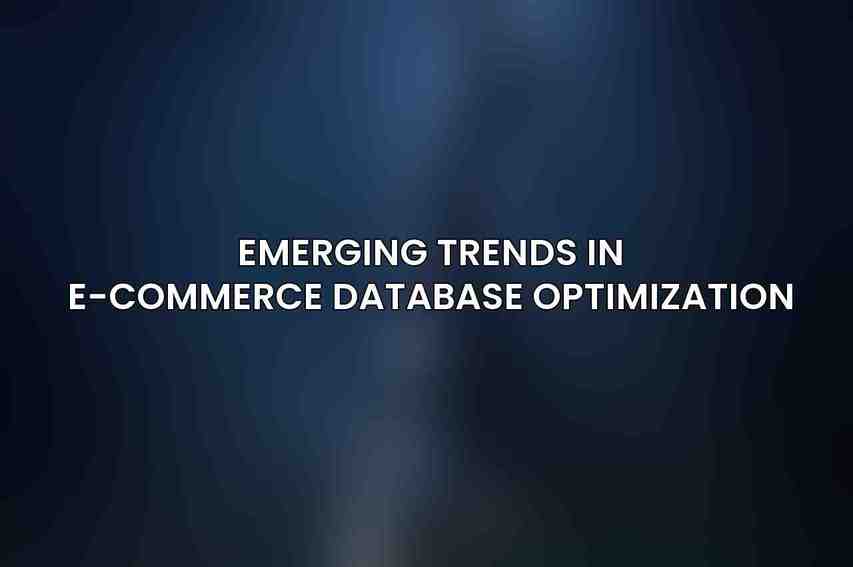database optimization plays a pivotal role in ensuring efficient operations and seamless user experiences. The significance of optimizing databases for e-commerce cannot be overstated, as the performance and responsiveness of the database directly impact the customer’s journey on an online platform. Common challenges often encountered in e-commerce database management include slow query processing, data inconsistencies, and scalability issues. By implementing effective optimization strategies, e-commerce businesses can enhance their website’s performance, increase reliability, and ultimately drive higher customer satisfaction and retention rates.
Optimizing an e-commerce database offers a myriad of benefits that directly contribute to the success of online businesses. From improved website speed and responsiveness to enhanced data security and scalability, the advantages of database optimization are multifaceted. By streamlining database operations, businesses can efficiently handle increasing traffic volumes, support dynamic content updates, and provide a seamless shopping experience to customers.
Database Schema Design

A. Normalization vs. Denormalization
In database schema design, the choice between normalization and denormalization plays a crucial role in optimizing database performance. Normalization involves structuring data to minimize redundancy and dependency, whereas denormalization consolidates data for quicker retrieval. Strike a balance between the two approaches based on the specific requirements of the e-commerce platform.
B. Indexing Strategies for E-commerce Databases
Indexing is fundamental for speeding up query processing in databases. Various types of indexes, such as B-tree and hash indexes, can be utilized to enhance data retrieval efficiency. Consider factors like query patterns and data distribution when selecting the appropriate indexing strategy for an e-commerce database.
C. Partitioning Techniques
Partitioning techniques like vertical and horizontal partitioning assist in managing large volumes of data effectively. Vertical partitioning involves segregating columns into separate tables, while horizontal partitioning divides rows based on a defined condition. Implement partitioning strategies to optimize data storage and retrieval performance.
D. Data Distribution Patterns
Understanding data distribution patterns is essential for efficient data retrieval and processing. Whether through sharding or replication, leveraging appropriate data distribution strategies can significantly impact the performance and scalability of e-commerce databases.
Query Optimization
A. Understanding Query Types in E-commerce
Different query types in e-commerce, such as product searches, order processing, and analytics queries, necessitate tailored optimization techniques. By analyzing the characteristics of each query type, businesses can optimize database performance based on specific requirements.
B. Techniques for Query Optimization
Implementing query optimization techniques like query caching, query rewriting, and query planning can dramatically enhance database performance. By caching frequently accessed data, rewriting inefficient queries, and devising optimal query execution plans, e-commerce platforms can reduce response times and improve user satisfaction.
Data Management
A. Data Integrity and Consistency
Maintaining data integrity and consistency is paramount for e-commerce databases. Employing mechanisms such as constraints, triggers, and proper data validation processes ensures that the data remains accurate and reliable throughout its lifecycle.
B. Data Maintenance Strategies
Effective data maintenance strategies encompass regular data cleaning, validation procedures, and robust backup and recovery mechanisms. By proactively managing data quality and ensuring disaster recovery preparedness, e-commerce businesses can safeguard critical information and mitigate operational risks.
C. Data Storage Optimization
Optimizing data storage involves utilizing compression techniques and selecting suitable storage media. By compressing data to reduce storage requirements and choosing appropriate storage mediums such as SSDs (Solid State Drives) over HDDs (Hard Disk Drives), e-commerce platforms can optimize storage efficiency and performance.
Hardware Optimization
A. CPU and Memory Requirements
Understanding the CPU and memory requirements of the database server is essential for optimal performance. By allocating adequate resources based on workload demands, businesses can ensure smooth database operations and responsive query processing.
B. Storage Configurations
Choosing the right storage configurations, such as SSDs for faster data access or HDDs for cost-effective storage, can significantly impact database performance. Tailor storage solutions to meet the needs of the e-commerce platform and strike a balance between speed, capacity, and cost-effectiveness.
C. Network Optimization
Optimizing network infrastructure, including bandwidth allocation and latency reduction measures, is crucial for seamless communication between database servers and client devices. By optimizing network configurations, e-commerce businesses can minimize data transfer delays and enhance overall system performance.
Database Monitoring and Tuning
A. Database Performance Monitoring Tools
Deploying robust database performance monitoring tools enables businesses to track key performance metrics, identify bottlenecks, and proactively address performance issues. Utilize tools like MySQL Enterprise Monitor, Oracle Enterprise Manager, or third-party monitoring solutions to monitor database health and performance parameters.
B. Key Performance Indicators for Database Optimization
Establishing key performance indicators (KPIs) specific to database optimization, such as query response times, throughput, and resource utilization metrics, aids in assessing database performance and identifying areas for improvement. Monitor KPIs regularly to ensure ongoing optimization and efficient database operations.
C. Performance Tuning Techniques
Fine-tuning database performance involves adjusting parameters, analyzing query plans, and optimizing resource utilization. By fine-tuning database configurations, query execution plans, and indexing strategies, e-commerce platforms can enhance overall system performance and responsiveness.
Cloud Database Optimization
A. Benefits of Cloud Databases for E-commerce
Cloud databases offer scalability, flexibility, and cost-effectiveness for e-commerce businesses. Leveraging cloud services enables dynamic resource allocation, seamless scalability, and high availability, making it an ideal solution for managing fluctuating workloads and ensuring business continuity.
B. Common Cloud Database Optimization Strategies
Optimizing cloud databases involves strategies like auto-indexing, data replication for high availability, and leveraging scalability features. By capitalizing on cloud-native optimization tools and services, e-commerce platforms can streamline database management, enhance performance, and improve operational efficiency.
Case Studies
A. Examples of Successful E-commerce Database Optimization Projects
Analyzing real-world case studies of successful e-commerce database optimization projects provides valuable insights into best practices and effective strategies. By studying successful implementations, businesses can learn from industry experiences, avoid common pitfalls, and optimize their own database infrastructure for improved performance.
B. Best Practices and Lessons Learned
Identifying best practices and lessons learned from e-commerce database optimization initiatives is essential for continuous improvement. By adopting industry best practices, incorporating lessons from previous optimization efforts, and fostering a culture of optimization, businesses can drive innovation, efficiency, and competitiveness in the e-commerce world.
Emerging Trends in E-commerce Database Optimization

A. Database as a Service (DBaaS)
The emergence of Database as a Service (DBaaS) models offers e-commerce businesses a scalable and cost-effective solution for database management. With DBaaS, businesses can outsource database operations to cloud service providers, reducing administrative overhead, enhancing scalability, and focusing on core business activities.
B. In-Memory Databases
In-memory databases leverage high-speed data storage mechanisms to accelerate data retrieval and processing. By storing data in-memory rather than on disk, e-commerce platforms can achieve significant performance gains, reduced latency, and improved user experiences. Adopting in-memory database technologies can revolutionize database performance in e-commerce environments.
C. Big Data Analytics for E-commerce
Integrating big data analytics capabilities into e-commerce databases enables businesses to glean valuable insights from vast volumes of data. By leveraging technologies like Hadoop, Spark, and machine learning algorithms, e-commerce platforms can analyze customer behavior, trends, and patterns to drive personalized marketing strategies, optimize operations, and enhance customer experiences.
database optimization is a critical component of e-commerce hosting that directly influences website performance, user experiences, and business success. By implementing sound database design principles, query optimization techniques, data management strategies, hardware optimizations, and cloud database solutions, e-commerce businesses can achieve optimal database performance, scalability, and reliability. Adopting emerging trends like DBaaS, in-memory databases, and big data analytics further propels e-commerce platforms towards innovation, efficiency, and competitiveness in the dynamic online marketplace. Continual investment in database optimization is key to sustaining a competitive edge and meeting the evolving demands of e-commerce consumers in the digital age.
Frequently Asked Questions
1. What is database optimization and why is it important for e-commerce hosting?
Database optimization is the process of improving the performance of a database to ensure faster retrieval of data, reduced load times, and overall better user experience. It is crucial for e-commerce hosting as it helps in efficiently managing large volumes of data and high traffic that e-commerce websites generally experience.
2. What are some common database optimization strategies for e-commerce hosting?
Some common database optimization strategies for e-commerce hosting include indexing frequently queried columns, utilizing caching methods to reduce database load, optimizing queries for better performance, using database normalization techniques, and regularly cleaning up outdated data and indexes.
3. How can indexing help in database optimization for e-commerce hosting?
Indexing helps in speeding up data retrieval by creating a structured list of keys that points to the location of data within a database. By indexing frequently queried columns, the database can quickly locate and retrieve the required information, leading to improved performance and reduced load times for e-commerce websites.
4. Why is it important to regularly clean up outdated data and indexes in database optimization?
Regularly cleaning up outdated data and indexes is essential for database optimization as it helps in reducing storage space, improving query performance, and maintaining data integrity. Over time, database clutter can slow down performance and impact the overall efficiency of e-commerce hosting.
5. What role does query optimization play in database optimization for e-commerce hosting?
Query optimization involves refining and restructuring database queries to enhance performance and reduce execution time. By optimizing queries for e-commerce hosting, businesses can ensure faster data retrieval, minimized load times, and improved user experience on their websites.

